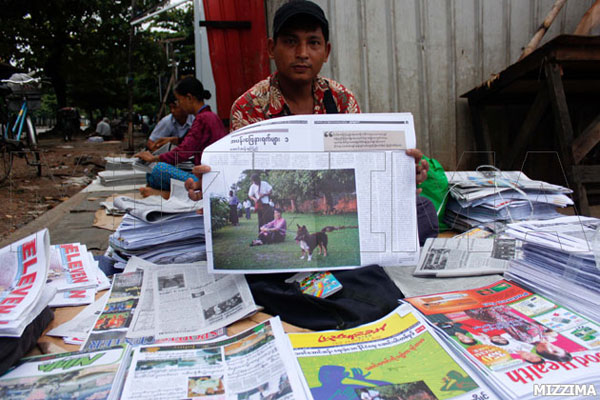The new media law bill to be introduced in the Burmese Parliament in February will introduce major changes to Burma’s media landscape, said an official quoted in the Myanmar Times on Monday.

However, he said that the law will apply only to print publications and not to broadcast or online media.
The deputy director general of the Ministry of Information’s Press Scrutiny and Registration Division, U Tint Swe, told reporters that some sections of the proposed law had been taken from similar laws in Cambodia, Indonesia and Vietnam, without mentioning what kind of rights he was referring to.
“We have named it the ‘Printing Presses and Publications Law’ and it has nine chapters, including the rights and ethics of journalists and the registration [process] for publishers,” the deputy director general said at a meeting with about 50 publishers and editors on January 25.
“We have taken certain rights for journalists from the Cambodian media law, some from Indonesia and Vietnam as well. I am sure you will be happy when it comes out, even though I wouldn’t call it perfect,” he was quoted as saying.
The bill will be submitted to Parliament for debate, but observers noted that any major changes would be hard to push through.
The majority of publications in Burma now exercise a “self-censorship” approach to covering evetns and personalities. However, publications that cover news, business and religion still must pass all content through censors prior to publication.
U Tint Swe hinted to reporters in Rangoon that the most sensitive topic lately has been coverage of the Kachin State peace negotiations. Another sensitive topic recently was the eviction of a popular abbot from his monastery after he spoke at a National League for Democray event. The story was not reported by Burma’s domestic news media, but was covered by exiled and international media.
“I have said the government press censorship should not exist any more … and we don’t want the peace process to veer off course because of an erroneous news item that might be published without our knowledge,” Tint Swe was quoted as saying.
“To be honest, I am not even in a position to decide [whether to allow] some sensitive stories relating to peace negotiations with national groups, among which the Kachin Independence Organisation is the most serious.”
Another sensitive issue is opening up Burma to more reporters representing the international media..
Some exiled media, like Mizzima, are investigating options for expanding their presence inside the country.
In early December, the bureau chief of the VOA, U Than Lwin Tun, met with Minister for Information U Kyaw Hsan. He later told local media that his visit was not for reporting news.
“I am here to discuss work with the minister,” he said. “I didn’t ask him when he would give media freedom. I told him what I want to do in the future and if it is possible. In a way, this is indirectly asking him, how far would he allow the media to go,” he said.
There are more than 50 weekly news journals publishing regularly in Burma that still go through the system of pre-publication censorship, the Myanmar Times said.


